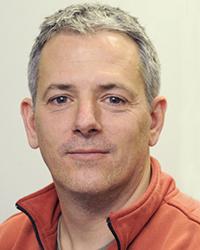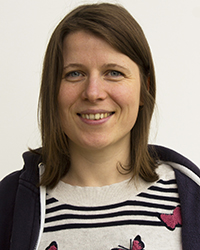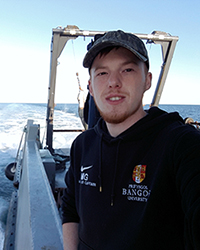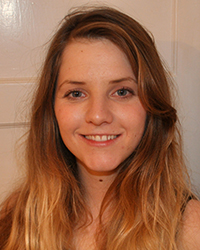Staff
 Prof Stuart Jenkins (Project Lead, Wales-based)
Prof Stuart Jenkins (Project Lead, Wales-based)
I graduated in Zoology from Cambridge University in 1990 and undertook my PhD in intertidal ecology at Port Erin Marine Laboratory, on the Isle of Man between 1991 and 1995. I remained at Port Erin for a further 6 years, undertaking two post-doctoral research posts, the first, within the EUROROCK project, addressing ecological questions on intertidal rocky shores over a European scale and the second, examining the impacts of demersal fishing techniques on benthic communities. In 2001 I was appointed a Research Fellow at the Marine Biological Association where I developed a research group in experimental benthic ecology. In 2007 I moved to the School of Ocean Sciences, in 2009 was appointed Reader in Marine Ecology and was awarded a personal chair in 2015.
I am an experimental benthic ecologist and over the past 25 years I have addressed questions in both fundamental and applied ecology in intertidal and shallow sub-littoral habitats. Particular areas of interest include: the transport, supply and recruitment dynamics of benthic invertebrate larvae; the role of ecosystem engineers and key herbivores in intertidal systems and the generality of their effects over large geographic scales; the role of biodiversity in marine systems; the ecology of non native species and practical biosecurity interventions; anthropogenic impacts in the marine environment. I take an empirical approach using a combination of field / mesocosm experiments and long term surveys.
 Dr Isobel Bloor (Post-doctoral Researcher, IOM-based)
Dr Isobel Bloor (Post-doctoral Researcher, IOM-based)
After graduating from Queen Mary’s University of London with an MSc in Marine Ecology and Environmental management, I worked as a marine ecologist at a small independent marine consultancy managing the impacts of marine related projects. I then worked on a 3 year cross-Channel EU project on cephalopod ecology and completed my PhD in conjunction with the Marine Biological Association and the Marine Institute, University of Plymouth on Cephalopod ecology, movement and behaviour, undertaking the first electronic tagging field study of the common cuttlefish (Sepia officinalis) in the field. My PhD research was predominately fisheries and field-work based working directly with inshore potting fishermen, undertaking acoustic and data storage tagging studies and completing in situ scuba surveys of spawning grounds.
I have been in my current role as a postdoctoral fisheries scientist on the Isle of Man since 2013 which involves providing the science and advice necessary to assist the government in managing the commercial fisheries within the Isle of Man territorial sea. I am actively engaged in research with the mobile gear sector which involves: annual scientific research surveys, developing stock assessment methods for scallop stocks within the Isle of Man and the wider Irish Sea; developing fisheries dependent electronic data collection methods, automating reporting to support fisheries management (i.e.Rshiny dashboards), co-management approaches to fisheries management, industry survey development and analysis. Please see the current Research Projects for more information.
Dr Matthew Coleman (Post-doctoral Researcher, IOM-based)
I am fisheries scientist focusing on the management and the interaction of biological characteristics of crustacean stocks in static gear fisheries. I gained a BSc in Zoology from the University of Exeter and a MSc Marine Biology from Bangor University. Following graduation from Bangor University I have worked as a fisheries scientist for Orkney Sustainable Fisheries in Orkney, Scotland for the past 7 years. During my time in Orkney, I undertook a part-time industry funded PhD with Heriot-Watt University focusing on addressing key knowledge gaps on reproductive biology of the European lobster and their incorporation in sustainable regional management, working collaboratively with other researchers from France to Norway. My current role will be postdoctoral research associate working on the Isle of Man and undertaking research on the statics gear fisheries in the Isle of Man territorial Sea. Providing scientific advice for sustainable management of its crab, lobster, and whelk fisheries.
 Matthew Garratt (PhD Student, IOM-based)
Matthew Garratt (PhD Student, IOM-based)
I graduated from Bangor University in 2017 with a BSc in Ocean Science, and then stayed on to pursue a MSc in Marine Environmental Protection. My MSc project looked at the effects of artificial light pollution on an intertidal ecosystem and was subsequently published in Science of The Total Environment. After completing my Masters in 2018, I moved to the Isle of Man and over the last two years have worked at DEFA as a research assistant to Bangor University fisheries scientists. I was employed on various contracts and involved in a wide variety of fisheries projects, including scallop surveys on commercial and research vessels, onshore sampling at processors, size at maturity dissections, benthic habitat mapping and analysis of logbook and VMS data. During this period, I also undertook some part-time work at a marine benthic consultancy on the Island, gaining further laboratory skills.
As of April 2021, I am undertaking a PhD with Bangor University focused on the sustainability of the Isle of Man whelk fishery. The overall aim of my research is to provide the scientific basis for sustainable management of the fishery and deliver recommendations to the Isle of Man Government. My work will build on previous science to develop a reliable method for assessing whelk stocks around the Isle of Man, working closely with industry stakeholders to establish a suitable monitoring framework.
Dr Jennifer Shepperson (Post-doctoral researcher and lecturer, Wales-based)
After graduating from Cardiff University with a BSc in Ecology, I worked at Archipelagos Ins titute of Marine Conservation in Greece. During this time I also undertook an MSc in Geographic Information Systems as a distance learning student at Ulster University. I then studied for a PhD at Bangor University, where I developed an individual based model to predict the behavioural response of fishers to management (e.g. spatial displacement following area closures). My postdoctoral research involved translating research on the benthic impacts of trawling into quantitative tools to assess fisheries impacts on the benthic environment, specifically for the Marine Stewardship Council’s eco-certification program, and for adaptive management of MPAs. In my current role as lecturer in marine biology at Bangor University I predominantly teach data skills (e.g. using R and GIS), and my research focus is on quantifying the benthic impacts of trawling, including investigating trade-offs between model complexity and accessibility (i.e. data requirements), as well as the incentives (both positive and negative) that such a tool can create for fisheries.
titute of Marine Conservation in Greece. During this time I also undertook an MSc in Geographic Information Systems as a distance learning student at Ulster University. I then studied for a PhD at Bangor University, where I developed an individual based model to predict the behavioural response of fishers to management (e.g. spatial displacement following area closures). My postdoctoral research involved translating research on the benthic impacts of trawling into quantitative tools to assess fisheries impacts on the benthic environment, specifically for the Marine Stewardship Council’s eco-certification program, and for adaptive management of MPAs. In my current role as lecturer in marine biology at Bangor University I predominantly teach data skills (e.g. using R and GIS), and my research focus is on quantifying the benthic impacts of trawling, including investigating trade-offs between model complexity and accessibility (i.e. data requirements), as well as the incentives (both positive and negative) that such a tool can create for fisheries.